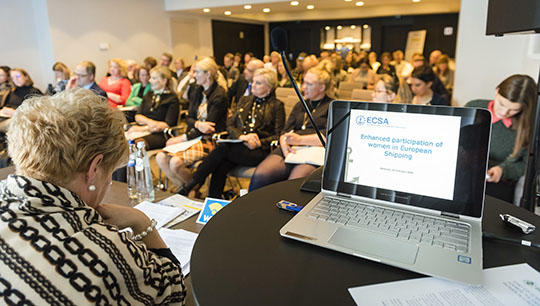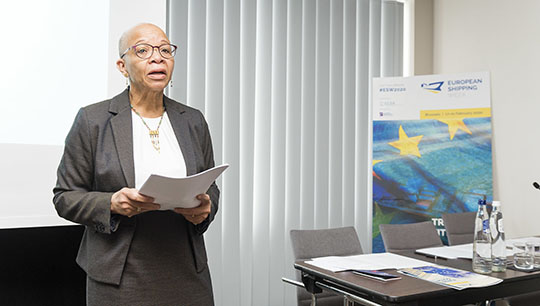Barriers to work highlighted by female seafarers at European Shipping Week
24 February 2020

'I started with a new company and they carried out a referendum to ask the all-male crew if they wanted a woman onboard. They all said no, and the company sent me anyway.'
'I have a name which could be male or female. One ship obviously expected a woman and when I arrived, they all looked at each other and wondered what to do with me.'
'At my maritime school, teachers were openly negative about having women onboard ships.'
The female seafarers that told these anecdotes and many like them to a conference on the participation of women in European shipping, were able to look back and laugh at some of the hurdles they have faced throughout their careers at sea, but they highlight the very real struggles still faced by females going to sea today.
Nautilus International member Aike Cattie told the audience that whilst going to sea had been the 'best decision I ever made', her journey had not been an easy one.
'If you make one small mistake, then you are not suitable for the job,' she said. 'Male colleagues are promoted quicker and, in some countries and cultures women in leadership roles are simply not accepted.
'Despite that, I had had some of the best jobs in the world and I wish other women were able to choose this profession and be treated equally.'
Opening the meeting Dr Cleo Doumbia-Henry, president of the World Maritime University, noted that the global level of female seafarers has remained at around 2% for nearly 30 years, hardly increasing in all the time that the statistics have been collected.
'Why has it been so difficult to break down those walls?' she asked. 'Women still face institutional discrimination on may levels, including tax systems, social justice, violence and harassment in the workplace and low representation.
'The "motherhood penalty" is also a big factor.'
She added that technology and automation in shipping could be the defining factor that brings an end to the gender imbalance in maritime.
'Women's participation in the very beginning of the technical design process will be very important for ensuring potential problems are dealt with at the very start of the fourth industrial revolution that we are entering.'
Dr Doumbia-Henry called on the shipowners present at the meeting to establish mentoring programmes for female seafarers, to emphasise the business case for gender equality and to ensure safe environments for women working at sea.
- Download the European Transport Workers' Federation (ETF) Maritime Transport Section report for European Shipping Week – The future of shipping needs to be social.

Tags
